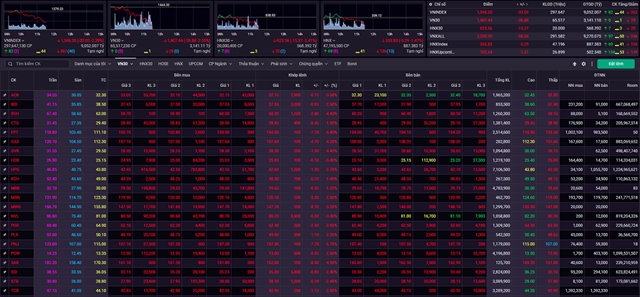
HCM CITY — The sell-off in the Vietnamese stock markets has been consistent with what has been occurring in global markets, though selling pressure was exacerbated by many new retail investors dealing with margin calls for the first time and a crackdown on firms that borrowed money to buy stocks.
None of this is however likely to have much impact on Việt Nam’s economic growth or on the aggregate earnings of listed companies, Michael Kokalari, VinaCapital’s chief economist, assured.
“In Q1 earnings surged by around 30 per cent year-on-year, and we expect the earnings of all of the companies listed on the Hà Nội and HCM stock exchanges to surge by nearly 30 per cent this year.”
Việt Nam’s benchmark VN-Index sold off 11 per cent last week and was down 21 per cent in the year to date at the end of last week after being nearly flat until March end, he said.
Meanwhile, Việt Nam’s economy is staging a strong recovery, which is driving robust earnings growth, meaning the primary catalyst for the sell-off is the ongoing drop in global stock markets and forced selling of stocks related to margin lending, he pointed out.
The number of retail stock investors has gone up nearly 70 per cent over the last 12 months and most of those new entrants to the market were enticed to open margin trading accounts with the lure of making quick profits, he said.
The correction in global markets triggered margin calls and many of these new investors simply abandoned their long positions, he said.
“We estimate that brokers’ outstanding balances have dropped by about 25 per cent from peak levels a few weeks ago. However, in addition to the forced selling of stocks prompted by margin calls on individual investors, there is an additional driver of stock margin related selling.
“Some local companies borrowed money with the stated purpose that the funds would ultimately finance real estate development and/or other projects, but the local business press has reported that certain firms then turned around and used the money to participate in the stock market.
“The Government is now cracking down on this misuse of funds, which is another source of forced selling of stocks.
“Furthermore, emerging and frontier stock markets will suffer from a 15 per cent year-on-year surge in the value of the US dollar because a strong appreciation in the [dollar] typically dissuades investors from investing in emerging/frontier stock markets.
“That said, Việt Nam’s economy is very strong, which helped propel 29 per cent earnings growth in Q1, which we believe will help the market weather the current global stock market turbulence.”
The VN-Index’s sell-off comes despite the compelling fundamental strengths of its stock market like a forward P/E ratio of 11.4 versus 21 per cent consensus earnings growth expectations this year and 30 per cent valuation discount versus Việt Nam’s regional peers, he said.
“There has been a fairly pronounced performance dispersion among the sectors of the stock market, which is generally attributable to fundamental factors, giving investors opportunities to take shelter in defensive sectors.”
He said three sectors stand out as pockets of relative strength, namely utilities, consumer discretionary and IT, the stock prices of which are being supported by strong Q1 results as well as other fundamental factors.
The earnings and stock price performances in the utilities sector are supported by a doubling of electricity production growth this year, while consumer discretionary stocks are benefitting from the ambitious expansion plans of some key companies in the sector, he said.
The IT sector’s earnings and stock price performance are being driven by a 30 per cent increase in the outsourcing revenues of FPT, the dominant player in the sector, and a near 60 per cent increase in its new outsourcing contracts in Q1, he said.
The earnings of materials companies soared by nearly 60 per cent year-on-year in Q1, driven by an eight-fold increase in the earnings of fertiliser companies and 45 per cent rise in consumer staples companies’ earnings, he said.
The value of the đồng is nearly unchanged year-on-year despite a 15 per cent surge in the US Dollar/DXY index.
“We believe the resilience of the Việt Nam đồng despite the sharp appreciation of the US dollar is an accurate indicator of the underlying strength of Việt Nam’s economy, which in turn should support the earnings growth and price appreciation of the market.” — VNS
Xem thêm: lmth.gnorts-si-ymonoce-snv-nehw-ffo-lles-tekram-kcots-eht-yhw/7413911/ymonoce/nv.swenmanteiv